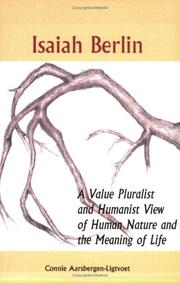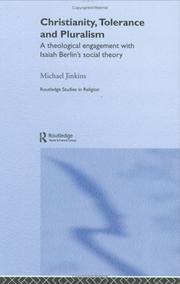| Listing 1 - 6 of 6 |
Sort by
|
Book
ISBN: 9781786838957 9781786838964 Year: 2022 Publisher: Cardiff University of Wales Press
Abstract | Keywords | Export | Availability | Bookmark
 Loading...
Loading...Choose an application
- Reference Manager
- EndNote
- RefWorks (Direct export to RefWorks)
Book
ISBN: 0191654159 1299476104 9780191654152 9780199673261 0199673268 Year: 2013 Publisher: Oxford Oxford University Press
Abstract | Keywords | Export | Availability | Bookmark
 Loading...
Loading...Choose an application
- Reference Manager
- EndNote
- RefWorks (Direct export to RefWorks)
A detailed study of Isaiah Berlin: historian, philosopher, and political theorist. Situates his evolving ideas in the context of British society and world politics. Offers a new interpretation of Berlin's influential writings on liberty and his debts to philosophy, and makes clear his relationship to the political debates of his times.
Liberalism --- Liberty. --- Philosophers --- Philosophy, Modern --- Political science --- Moral and ethical aspects. --- Philosophy. --- Philosophy --- History --- Berlin, Isaiah,

ISBN: 9042019298 9789042019294 9401202613 142379088X 9789401202619 9781423790884 Year: 2006 Volume: 27 Publisher: Amsterdam Rodopi
Abstract | Keywords | Export | Availability | Bookmark
 Loading...
Loading...Choose an application
- Reference Manager
- EndNote
- RefWorks (Direct export to RefWorks)
Value pluralism, a philosophical perspective belonging to the humanist and liberal family, is meeting with increasing attention and support in contemporary political and moral philosophy. Its starting point is that (personal and social) human life is characterized by conflict between the various (good) values and ends that are pursued. Value pluralism takes cultural and moral diversity seriously and thereby also denies the validity of - in their view - potentially dangerous monisms that promise a perfect, tension-free human life. But does value pluralism itself not lead to another danger -that of moral relativism and questioning the meaning of human life itself? This study describes the anthropology of Sir Isaiah Berlin (1909-1997), value pluralism's founding father. Berlin wants to protect both moral and cultural diversity against monist tendencies but at the same time struggles to avoid moral relativism. This study follows Berlin critically in this dilemma, thereby giving insight into how value pluralism differs from contemporary postmodernist and conventionalist positions. Through this study profound insight can be gained into the anthropological assumptions behind value pluralism. This study reveals the basic assumptions in Western and liberal thought that often remain implicit and hidden, leading to much misunderstanding and conflict. Berlin's ideas can enrich existing theories of pluralism and contribute to intercultural and interreligious dialogue. And, last but not least, Berlin's value pluralism helps us to understand the roots of ideologically and religiously inspired violence.
Philosophy and psychology of culture --- Religious studies --- Berlin, Isaiah --- Political science --- Pluralism --- Liberalism --- Science politique --- Pluralisme (Philosophie) --- Libéralisme --- Philosophy --- Philosophie --- Berlin, Isaiah, Sir --- Berlin, Isaiah, --- Ethics. --- Philosophical Anthropology. --- Pluralism. --- Worldview. --- Monadology --- Monism --- Reality --- Anthropology, Philosophical --- Man (Philosophy) --- Civilization --- Life --- Ontology --- Humanism --- Persons --- Philosophy of mind --- Deontology --- Ethics, Primitive --- Ethology --- Moral philosophy --- Morality --- Morals --- Philosophy, Moral --- Science, Moral --- Values

ISBN: 0415329086 0203391217 9780203391211 9780415329088 9780415646628 0415646626 9781134332267 1134332262 9781134332212 1134332211 9781134332250 1134332254 0203685474 9780203685471 1280078839 9781280078835 Year: 2004 Publisher: London New York Routledge
Abstract | Keywords | Export | Availability | Bookmark
 Loading...
Loading...Choose an application
- Reference Manager
- EndNote
- RefWorks (Direct export to RefWorks)
This book provides a sustained, critical and theological engagement with arguably the most crucial aspect of contemporary society - its diversity. The author finds in the social theory of Isaiah Berlin a number of fruitful ways to reframe the debate over these questions, and to contribute to a more positive conversation regarding our fundamental differences. The book focuses particularly on Berlin's critique of monism and idealistic utopianism, arguing that pluralism does not represent a failure in the nature of human society, but a superabundance of possibilities in a created world gr
Berlin, Isaiah --- Christianity and other religions --- Religious pluralism --- Christianity --- Religious tolerance --- Christianity and other religions. --- Syncretism (Christianity) --- Religions --- Christianity. --- Relations --- History --- Berlin, Isaiah, --- Berlin, Yeshaʻyah, --- Berlin, Yeshaʻyahu, --- Берлин, Исайя, --- Berlin, Isaĭi︠a︡, --- ברלין, ישעיהו --- Birlīn, Īzāyā, --- برلين، ايزايا
Book

ISBN: 9782722605374 2722605376 2722605384 Year: 2020 Publisher: Paris : Collège de France,
Abstract | Keywords | Export | Availability | Bookmark
 Loading...
Loading...Choose an application
- Reference Manager
- EndNote
- RefWorks (Direct export to RefWorks)
Par essence interdisciplinaire, l’histoire des idées construit des ponts entre des domaines qui, d’ordinaire, ne se rencontrent pas. Mais quelles relations l’histoire des idées entretient-elle exactement avec la critique littéraire et la philosophie ? Est-elle ce vers quoi nous devons nous tourner ou, au contraire, ce dont nous devons nous prémunir lorsque nous cherchons à comprendre les mutations intellectuelles collectives sur la longue durée ? Ce volume, qui réunit philosophes, spécialistes de littérature et historiens, aborde l’histoire des idées à travers ses écoles, ses œuvres et des figures atypiques telles que celles d’Étienne Gilson, Arthur O. Lovejoy, Hippolyte Taine, Anatole France, Isaiah Berlin, Paul Bénichou, Paul Hazard, Michel Foucault ou encore Martin Heidegger. Il brosse ainsi un portrait critique d’une discipline aux contours imprécis, qui a connu bien des variantes méthodologiques et soulevé bien des problèmes tout au long du xxe siècle et jusqu’à aujourd’hui.
Vie intellectuelle --- Philosophie. --- Critique littéraire. --- Histoire. --- Gilson, Étienne --- Lovejoy, Arthur Oncken --- Taine, Hippolyte Adolphe --- France, Anatole --- Berlin, Isaiah --- Bénichou, Paul --- Hazard, Paul --- Foucault, Michel --- Heidegger, Martin --- Critique et interprétation. --- Intellectual life --- History --- Gilson, Étienne, --- Lovejoy, Arthur O. --- Taine, Hippolyte, --- France, Anatole, --- Berlin, Isaiah, --- Bénichou, Paul. --- Hazard, Paul, --- Foucault, Michel, --- Heidegger, Martin, --- France --- Gilson, Étienne --- Taine, Hippolyte-Adolphe --- Bénichou, Paul --- Humanities, Multidisciplinary --- Philosophy --- Literary Theory & Criticism --- histoire des idées --- littérature --- philosophie --- critique littéraire --- Critique littéraire.
Book
ISBN: 0300195346 9780300195347 9781299648203 1299648207 0300192096 9780300192094 Year: 2013 Publisher: New Haven, Connecticut Yale University Press
Abstract | Keywords | Export | Availability | Bookmark
 Loading...
Loading...Choose an application
- Reference Manager
- EndNote
- RefWorks (Direct export to RefWorks)
Rancorous and highly public disagreements between Isaiah Berlin and Isaac Deutscher escalated to the point of cruel betrayal in the mid-1960s, yet surprisingly the details of the episode have escaped historians' scrutiny. In this gripping account of the ideological clash between two of the most influential scholars of Cold War politics, David Caute uncovers a hidden story of passionate beliefs, unresolved antagonism, and the high cost of reprisal to both victim and perpetrator. Though Deutscher (1907-1967) and Berlin (1909-1997) had much in common -- each arrived in England in flight from totalitarian violence, quickly mastered English, and found entry into the Anglo-American intellectual world of the 1950s -- Berlin became one of the presiding voices of Anglo-American liberalism, while Deutscher remained faithful to his Leninist heritage, resolutely defending Soviet conduct despite his rejection of Stalin's tyranny.
Political science --- Cold War --- Political scientists --- Policy scientists --- World politics --- Administration --- Civil government --- Commonwealth, The --- Government --- Political theory --- Political thought --- Politics --- Science, Political --- Social sciences --- State, The --- History --- Berlin, Isaiah, --- Deutscher, Isaac, --- Doĭcher, Isaak, --- Дойчер, Исаак, --- Bren, Josef, --- Brabiec, Adam, --- Grzela, Jan, --- Krakowski, A., --- Martens, D., --- Niemczycki, Ignacy, --- דויטשער, יצחק, --- اسحق دويتشر --- Berlin, Yeshaʻyah, --- Berlin, Yeshaʻyahu, --- Берлин, Исайя, --- Berlin, Isaĭi︠a︡, --- ברלין, ישעיהו --- Birlīn, Īzāyā, --- برلين، ايزايا --- Cold War (1945-1989) --- Cold War. --- History. --- History of theories
| Listing 1 - 6 of 6 |
Sort by
|

 Search
Search Feedback
Feedback About UniCat
About UniCat  Help
Help News
News